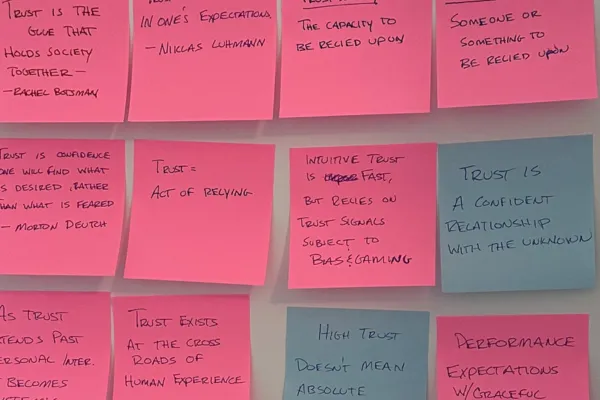
What is Trust
Struggling to create something clear & concise? Well you aren’t alone.
There is a large literature base on trust in different disciplines, and the definitions are “somewhat abstract”
Cary Funk of the Pew Research Center
Somewhat abstract is a academic speak for “no one really agrees”. Lately, in my endeavor to understand trust more deeply I have been compiling definitions of Trust from a variety of sources. Right now my favorites are:
“A confident relationship with the unknown” - Rachel Botsman
“Confidence one will find what is desired, rather than what is feared” - Morton Deutsch
Researchers highlight that Trust is about how we handle things that are beyond our capability to know or understand. For Rachel Botsman it’s the “unknown” while Morton Deutsch describes it as a place of fear. To be clear though, trust is not about reducing fear or removing the unknown. It's about well we sit comfortably with that fear.
Trust is the shelter that enables relationships to weather the stormy unknown.
Trust As An Equation
Rachel Botsman describes it as a balance of two key factors:
Capability – Belief that an individual has both the competence to complete an endeavor, and can be relied on to actually do it
Character - Belief that an individual cares about me & my concerns and will pursue an endeavor with integrity
We are trying desperately to answer the questions:
Can you help me?
And just as importantly:
Will you help me?
A fireman without any water doesn't make me feel better about the uncertain dangers posed by the risk of fire. Neither does a fireman who won't come to my aid because he doesn't care.
For trust to exist we need both components:
Trust = Capability * Character
When relationships are in their infancy, Trust is naturally low. To shore it up the Trust Seeker often defaults to proving capability, with an emphasis on competence:
Expertise & Knowledge
Execution
Demonstrated decision making
This isn't wrong per se, but it is very one dimensional. The limited focus on Capability also forces the need for a sort of "overweighting". As the demonstration of Character lags, Capability is forced to take up the slack. Ignoring the Character side means that empathy is ignored also - which is why so many professional networking engagements seem hollow. They're missing half the ingredients for Trust and successful relationships.
If you're looking for evidence of this dynamic you only need to look at most marketing materials. Character is difficult to signal, so marketing materials usually bring large numbers of capability focused statistics to forefront.
Starting From Zero
Every new relationship starts at zero, or maybe even slightly negative. Overcoming this trust deficit is the key to progressing the relationship. Our subconscious is processing the trust deficit with questions like:
How much can I Trust this person with my interests?
When I can’t see them, how will they act?
Can they actually do what they are saying?
My advice - think about that Trust equation and how to make deposits in both dynamics.
I plan to continue writing about these dynamics - in my next blog I'll break down the dynamics into 4 individual traits that will highlight how best to establish and repair trust.